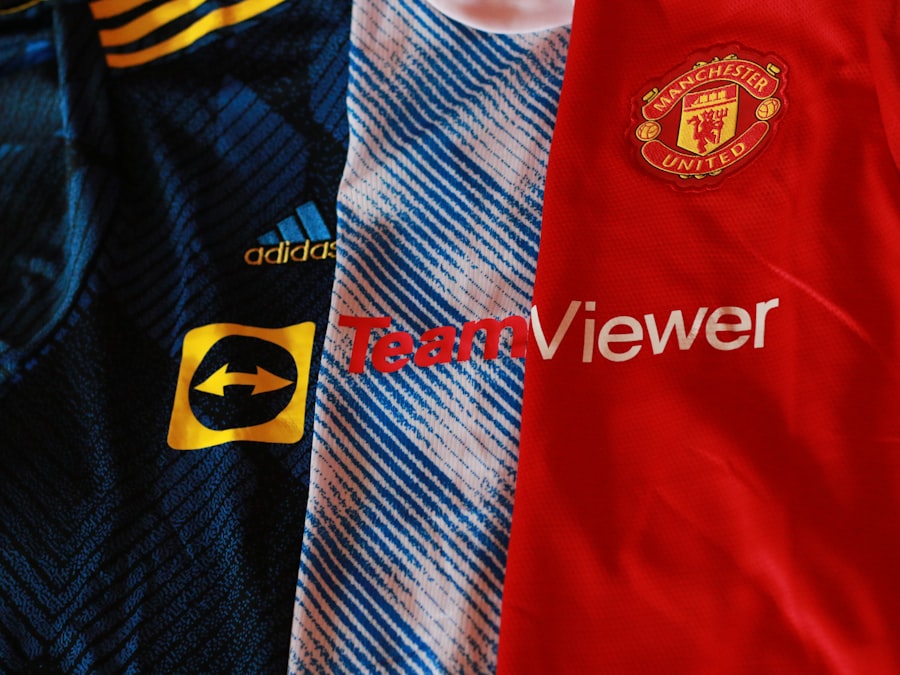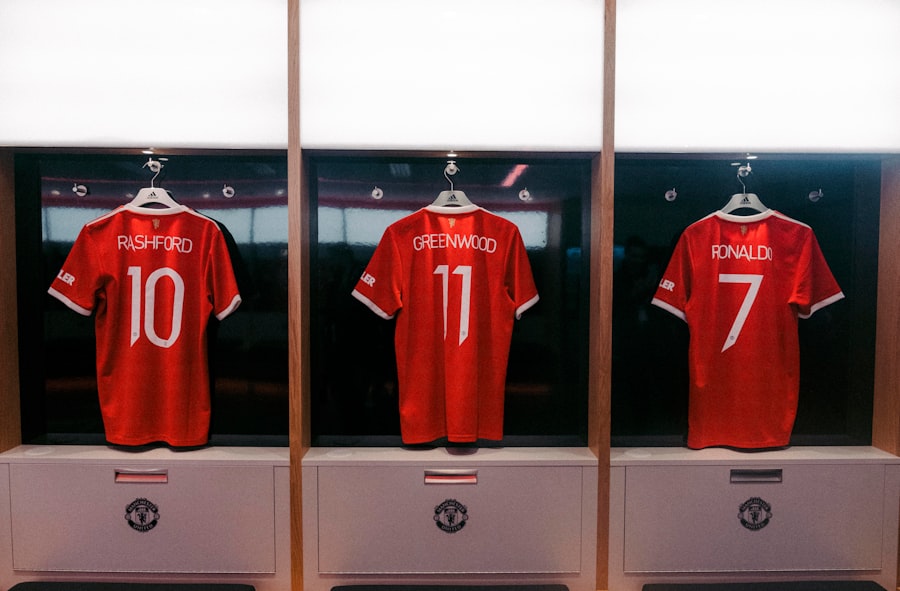Manchester United, one of the most storied football clubs in the world, has long been recognized not only for its on-field success but also for its innovative marketing strategies. The club’s brand transcends the sport itself, reaching millions of fans globally and generating substantial revenue through various channels. The marketing strategy of Manchester United is a multifaceted approach that encompasses traditional advertising, digital engagement, merchandise sales, and global outreach initiatives.
This strategy has evolved over the years, adapting to changes in consumer behavior, technological advancements, and the competitive landscape of sports marketing. The club’s marketing efforts are deeply intertwined with its identity and heritage. Founded in 1878, Manchester United has cultivated a rich history that resonates with fans across generations.
This legacy is a powerful tool in their marketing arsenal, allowing them to create emotional connections with supporters. The club’s iconic red jersey, the legendary Old Trafford stadium, and the illustrious list of past players all contribute to a brand that is synonymous with excellence and passion. As Manchester United navigates the complexities of modern marketing, it must balance its historical significance with contemporary trends to maintain its position as a leader in the sports industry.
Key Takeaways
- Manchester United’s marketing strategy focuses on global brand expansion and fan engagement.
- Current marketing efforts leverage digital platforms but have gaps in personalized fan experiences.
- Key improvement areas include enhancing data analytics and localizing content for diverse markets.
- The new strategy emphasizes innovative campaigns, stronger community ties, and multi-channel outreach.
- Success will be measured through fan engagement metrics, brand loyalty growth, and revenue increases.
Analysis of Current Marketing Approach
Manchester United’s current marketing approach is characterized by a blend of traditional and digital strategies aimed at maximizing fan engagement and revenue generation. The club has invested heavily in digital platforms, recognizing the importance of social media and online content in reaching younger audiences. With millions of followers across platforms like Twitter, Instagram, and Facebook, Manchester United leverages these channels to share updates, behind-the-scenes content, and interactive experiences that resonate with fans worldwide.
This digital-first approach allows the club to maintain a constant dialogue with its supporters, fostering a sense of community and belonging. In addition to digital engagement, Manchester United has also focused on expanding its global footprint through strategic partnerships and sponsorships. The club has established lucrative deals with major brands such as Adidas, Chevrolet, and Aon, which not only provide financial support but also enhance the club’s visibility in international markets.
These partnerships often include co-branded merchandise and promotional campaigns that align with the club’s values and appeal to its diverse fan base. Furthermore, Manchester United has made significant investments in its youth academy and community outreach programs, reinforcing its commitment to nurturing talent and giving back to society.
Identifying Areas for Improvement

Despite its strong marketing presence, there are several areas where Manchester United could enhance its strategy to better connect with fans and drive revenue growth. One significant challenge is the perception of the club among younger audiences who may view it as disconnected from contemporary culture. As new generations of fans emerge, it is crucial for Manchester United to adapt its messaging and engagement tactics to resonate with their values and interests.
This may involve embracing more progressive social issues or collaborating with influencers who can bridge the gap between the club’s traditional image and modern cultural trends. Another area for improvement lies in the club’s merchandise strategy. While Manchester United boasts a vast array of products ranging from jerseys to lifestyle apparel, there is an opportunity to innovate further by incorporating sustainable practices into their merchandise production.
As consumers become increasingly conscious of environmental issues, offering eco-friendly products could not only attract new fans but also strengthen loyalty among existing supporters who prioritize sustainability. Additionally, enhancing the online shopping experience through personalized recommendations and exclusive online-only merchandise could drive sales and improve customer satisfaction.
Developing a New Marketing Strategy
| Metric | Description | Target Value | Current Value | Notes |
|---|---|---|---|---|
| Market Research Completion | Percentage of market research tasks completed | 100% | 75% | Ongoing surveys and competitor analysis |
| Customer Segmentation Accuracy | Accuracy of identifying target customer segments | 90% | 80% | Based on recent data analytics |
| Brand Awareness Increase | Percentage increase in brand awareness | 25% | 10% | Measured via social media and surveys |
| Lead Generation Rate | Number of new leads generated per month | 500 leads | 350 leads | Through digital campaigns and events |
| Conversion Rate | Percentage of leads converted to customers | 15% | 12% | Improvement expected with new strategy |
| Customer Retention Rate | Percentage of customers retained over 6 months | 85% | 78% | Focus on loyalty programs |
| Marketing ROI | Return on investment from marketing activities | 150% | 120% | Tracking campaign effectiveness |
| Social Media Engagement | Average engagement rate on social platforms | 8% | 5% | Includes likes, shares, comments |
To address these challenges and capitalize on emerging opportunities, Manchester United must develop a comprehensive new marketing strategy that aligns with its brand values while appealing to a broader audience. This strategy should prioritize authenticity and inclusivity, ensuring that all fans feel represented and valued. One potential avenue is to create campaigns that highlight diverse fan stories and experiences, showcasing how Manchester United transcends cultural boundaries.
By amplifying voices from various backgrounds within the fan community, the club can foster a more inclusive environment that resonates with younger audiences. In addition to focusing on inclusivity, Manchester United should consider leveraging technology to enhance fan engagement further. The integration of augmented reality (AR) and virtual reality (VR) experiences could provide fans with immersive ways to connect with the club.
For instance, virtual stadium tours or AR-enabled merchandise could offer unique experiences that deepen fans’ emotional ties to the brand. Furthermore, investing in data analytics can help the club better understand fan preferences and behaviors, allowing for more targeted marketing efforts that resonate with specific segments of their audience.
Implementing the New Strategy
The successful implementation of this new marketing strategy will require a coordinated effort across various departments within Manchester United. Collaboration between marketing, digital media, community outreach, and merchandise teams will be essential to ensure a cohesive approach that aligns with the club’s overall objectives. Establishing clear goals and key performance indicators (KPIs) will help track progress and make necessary adjustments along the way.
For example, measuring engagement rates on social media platforms or tracking merchandise sales can provide valuable insights into the effectiveness of new campaigns. Moreover, engaging with fans during the implementation phase can foster a sense of ownership and loyalty among supporters. By soliciting feedback through surveys or focus groups, Manchester United can gain insights into what resonates most with its audience.
This participatory approach not only strengthens fan relationships but also ensures that the marketing strategy remains relevant and responsive to evolving preferences. Additionally, leveraging partnerships with local communities and organizations can enhance outreach efforts and create meaningful connections that extend beyond traditional marketing channels.
Measuring the Success of the Revamped Strategy

To evaluate the success of the revamped marketing strategy, Manchester United must establish robust metrics that capture both quantitative and qualitative data. Key performance indicators such as social media engagement rates, website traffic, merchandise sales growth, and attendance at matches will provide tangible evidence of progress. However, it is equally important to assess fan sentiment through surveys or sentiment analysis tools that gauge how supporters perceive the brand post-implementation.
Regularly reviewing these metrics will allow Manchester United to identify areas of success as well as aspects that may require further refinement. For instance, if social media engagement increases significantly following a campaign focused on inclusivity, it may indicate that fans appreciate this direction and want more content reflecting diverse perspectives. Conversely, if merchandise sales do not meet expectations despite increased online traffic, it may signal a need for improvements in product offerings or user experience on the e-commerce platform.
Engaging Fans and Building Brand Loyalty
Engaging fans effectively is crucial for building long-term brand loyalty in an increasingly competitive sports landscape. Manchester United has an opportunity to deepen connections with supporters by creating personalized experiences that cater to individual preferences. Utilizing data analytics can help identify fan interests based on their interactions with the club’s digital platforms, enabling tailored content delivery that resonates on a personal level.
Moreover, fostering community engagement through local initiatives can strengthen ties between the club and its supporters. Organizing events such as fan meet-and-greets or community service projects can create memorable experiences that reinforce loyalty. Additionally, implementing loyalty programs that reward fans for their engagement—whether through match attendance or social media interactions—can incentivize continued support while enhancing their overall experience with the brand.
Conclusion and Future Outlook
As Manchester United navigates the complexities of modern marketing in an ever-evolving sports landscape, it must remain agile and responsive to changing consumer preferences while staying true to its rich heritage. By embracing inclusivity, leveraging technology for enhanced fan engagement, and implementing data-driven strategies, the club can strengthen its brand presence both locally and globally. Looking ahead, Manchester United has the potential to redefine its marketing approach in ways that resonate deeply with current and future generations of fans.
By prioritizing authentic connections and innovative experiences, the club can continue to thrive as a global leader in sports marketing while fostering lasting loyalty among its diverse supporter base. The future outlook for Manchester United’s marketing strategy is bright; however, it will require ongoing commitment to adaptation and evolution in response to an ever-changing landscape.



